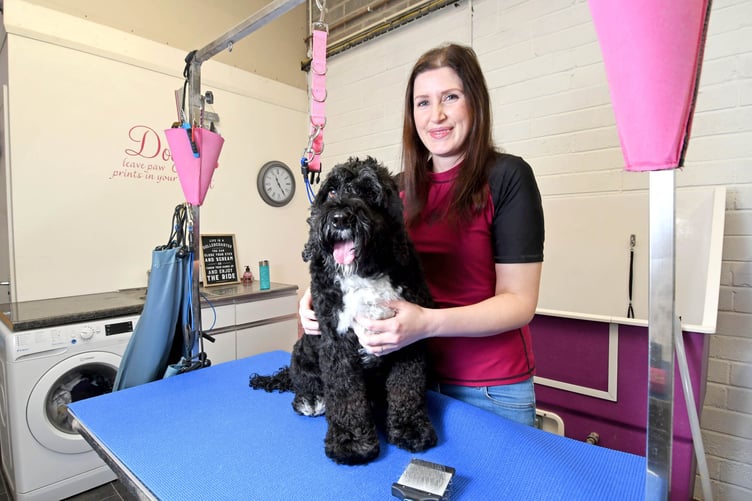As everyone knows – because we’ve been told it so often – vast numbers of families acquired dogs during the lockdown phase of the pandemic.
And very often they were the cute kind that peer at you through a mop of curly hair but don’t actually shed any of it.
The rise in popularity of cross breeds with names ending in ‘doodle’, has coincided with a rise in business for dog groomers.
Because these dogs are non-shedding they are great for anyone with allergies – the former US president Barack Obama famously bought one for his daughters – but this characteristic also has less welcome consequences for the dogs themselves.
‘A lot of the breeders don’t tell people how much grooming these dogs need so owners sometimes are quite shocked that this needs doing regularly,’ says Megan Coulthurst, owner of Bark & Brush Grooming Salon in Balthane.
She goes on: ‘A lot of non-shedding breeds, I keep them on a six weekly schedule so they don’t get matted – cockerpoos, poodles. Because they don’t shed, if they’re not groomed regularly, they become very matted and that is quite painful for them.
‘If you want to keep them long then they need to be brushed every day so it is a lot of maintenance for the owner.’
One customer who bought a non-shedding puppy in the UK was given a leaflet by the breeder telling her the dog shouldn’t be groomed until it was a year old:
‘The dog was in so much pain when I took the matted hair off: it was just red everywhere,’ says Megan.
Megan adds that she doesn’t groom dogs for shows or for appearance as much as for their comfort: ‘I enjoy making the dog comfortable and looking nice is a secondary thing. Grooming is very much about welfare to begin with.’
She is not short of business. She says: ‘I only take planned appointments, I don’t take walk-ins. My books have been closed to new customers for a long time but I do have some customers moving to England in the middle of this year so I do have some spaces coming up and what I’m looking for at the minute are people who can fill last-minute cancellation slots, that are quite flexible.
‘Because of Covid there’s been a lot of last-minute cancellations and then obviously you’re losing a lot of income so the terrier breeds that don’t need to come in as often, that can come in a fill a last-minute slot, would be helpful.’
Megan, who completed a City and Guilds Level 3 qualification in 2017, tells me that you don’t actually have to be qualified to become a dog groomer, and that there are some very good, unqualified, groomers in the island. But she adds that her training taught her that ‘there’s so much to it that you don’t realise, so it is really important to be qualified’.
She first opened her business in a shop unit in Port Erin, taking advantage of the Department for Enterprise Small Business Scheme which helped her with funding for some of the more expensive equipment purchases such as the grooming table, the hair dryers and the dog bath with a built-in heater.
‘It all adds up so that scheme was really helpful,’ she says.
The scheme also allocated her a mentor for the first 18 months and he proved to be invaluable during what turned out to be a tough start for her business, as Megan explains: ‘My mum passed away a few months into starting my business: she was really poorly so I had to take some time off to care for her.
‘So, what do you do? You’ve just started a business, you’ve got customers coming and then you’ve got to turn them away. My business advisor was really helpful, saying: “Look, your customers will understand” and he was right, all my customers were brilliant.
‘It’s things like that, that you don’t think of really, that the mentor really helped with.’
Megan is also grateful for the support she received during the pandemic.
She says: ‘We had to shut during lockdown so I thought I’d spend the time doing something constructive so I started a course doing canine behaviour.
‘Then, during the last lockdown, they said that we were allowed to open for what they call ‘welfare grooms’ – the dogs that were severely matted and in pain.
‘But without the government financial support I wouldn’t still be open, I don’t think, because obviously nothing was coming in.’
When a new client comes to her for the first time, Megan has a tried and tested routine to help them overcome their nerves.
She says: ‘If they have a bad experience the first time it can affect them for the rest of their lives.
‘So I will do desensitisation sessions first: there’s no grooming involved in that.
‘They’ll come in, I’ll put them on the table, I’ll give them a treat and I’ll put the dryer on, just away from them, and then give them another treat. It’s all about positive reinforcement and them getting used to the environment before I actually groom.
‘And then, the second appointment I might just do a bath. If they’re OK with the bath then we’ll go on to the groom at the next appointment.’
And, she adds, once they realise it’s not going to hurt them, some breeds – especially Labradors – actually like the process. Labs are one of the few big dog breeds Megan does because, she says, they will jump up quite happily into the purpose-built bath.
Ironically, she says, her husband is one of those people who are allergic to dog hair: ‘He’s been a lot better since I’ve been working here because I take home a lot of dog hair on my clothes so I think he’s just kind of becoming acclimatised to it.
‘He loves Border terriers but we could never have one because of the shedding so we’ve got a cockerpoo.’




-(2).jpeg?width=209&height=140&crop=209:145,smart&quality=75)
Comments
This article has no comments yet. Be the first to leave a comment.